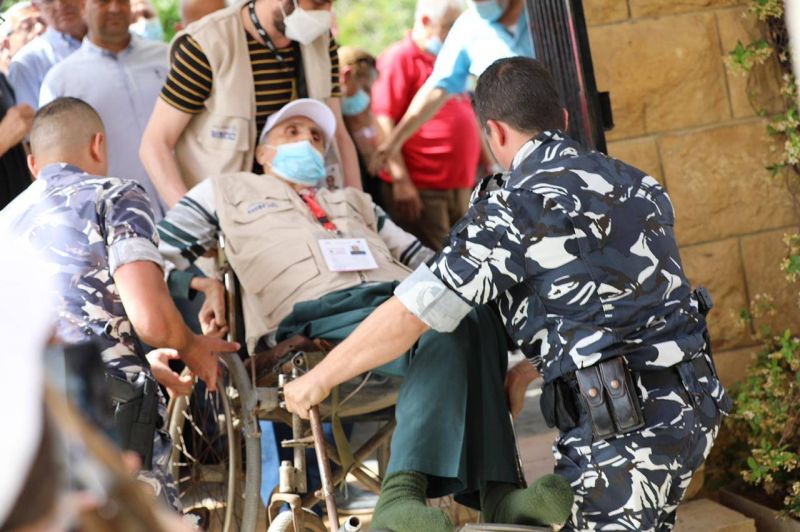
A wheelchair user is carried into a polling station in Hadath. (Credit: Matthieu Karam/L'Orient Today)
BEIRUT — Speaking after a tour of the polling center at Al Amir Shakib Arslan Mixed School in Verdun, European Union Election Observation Mission (EU EOM) chief observer György Hölvényi said that from what his team had observed, two-thirds of Lebanon’s polling centers are not accessible or “very difficult to access” for people with mobility issues.
Here’s what we know:
• Sylvana Lakkis, president of the Lebanese Union for People with Physical Disabilities, was quoted by a Human Rights Watch statement published on Tuesday as saying that some polling stations are located in more accessible locations, but only serve “a small number of people.”
• Lakkis told L'Orient Today that the group has some 200 observers stationed around the country, and according to what they had seen so far, the accessibility "is better [than in 2018] but very little until now." She said the monitors are attempting to assess how many of the polling stations are using ground floor facilities, as had been promised by officials.
• She added that in some cases, political parties are "bringing people to vote, surrounded by so many people, carrying them up the stairs" and entering polling booths under the pretense of assisting people with disabilities in voting. "There were some violations not acceptable at all," Lakkis said. "They are using the law, because the law says if a person needs help he or she can ask for an assistant to come with them to vote."
• Some people with critical medical conditions criticized the lack of accessibility at polling stations on Sunday, noting that many were not on the ground floor or in buildings accessible by wheelchair ramps. A physiotherapist in Bekaa told L’Orient Today that many of her patients were unable to access the stations to participate in the elections.
• Our reporter in Saida observed that only two of the five polling stations he visited in the city had wheelchair ramps, and in one case the ramp only led to the entrance of the building but not to the specific voting rooms. A voter had to be carried to the voting area by Civil Defense members.
• In the three other stations in Saida, people with disabilities — some wheelchair users, some elderly and some on crutches — had to be carried into the voting center by Civil Defense teams and security forces personnel, often up two flights of stairs.
• In Slayyib Janoubi polling station, an man over 80 years of age was carried upstairs by Marada Movement delegates so that he could vote.
• Michel Abi Hayla, voting in Bikfaya, said, “Every time we face the same problem when voting here. The center is not equipped for people who need special access. There are hundreds of steps to climb and it is not easy to carry everyone on the narrow stairs. Some voting stations are on the second floor. I don’t know what they are waiting for to fix it. It is very simple to just equip one room on the ground floor.”
• In Beirut, Khalid bin Walid school had a functional elevator for voters to use, while delegates from some political groups were carrying voters up and down the stairs in the polling station at the Omar bin Khattab school. At the Omar Farroukh public school in Cite Sportive, priority was given to elderly people, who did not have to wait in queues.
• In Maknounieh, Jezzine, the accessibility situation was much better, with polling centers equipped for people with disabilities at the initiative of the mayor of the town, the Social Affairs Ministry reported.
• Human Rights Watch on Tuesday called for the Lebanese authorities to “do more to ensure that people with disabilities and the elderly can vote freely and with dignity.” HRW questioned in a statement the ability of people with disabilities to vote “in safety,” noting that 10 to 15 percent of the Lebanese population has a disability and that the country has the oldest population in the Middle East.